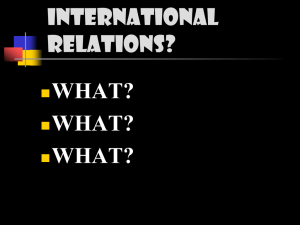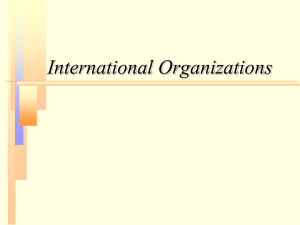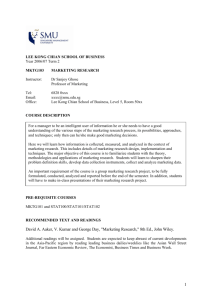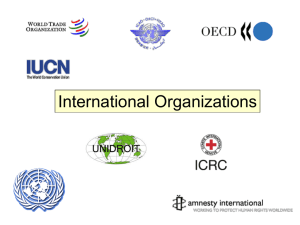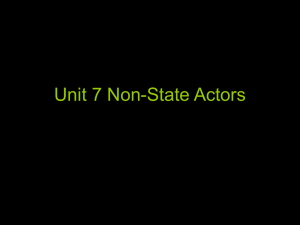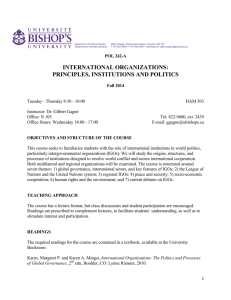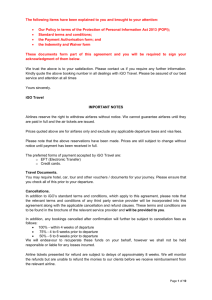Syllabus - Personal websites at UB
advertisement
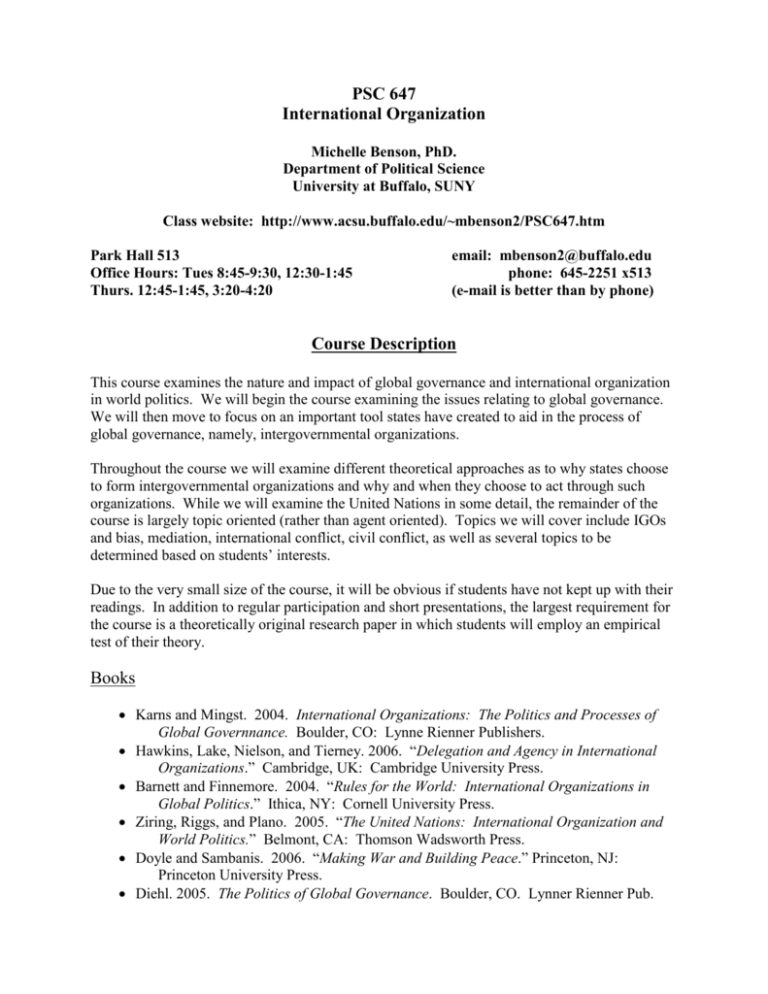
PSC 647 International Organization Michelle Benson, PhD. Department of Political Science University at Buffalo, SUNY Class website: http://www.acsu.buffalo.edu/~mbenson2/PSC647.htm Park Hall 513 Office Hours: Tues 8:45-9:30, 12:30-1:45 Thurs. 12:45-1:45, 3:20-4:20 email: mbenson2@buffalo.edu phone: 645-2251 x513 (e-mail is better than by phone) Course Description This course examines the nature and impact of global governance and international organization in world politics. We will begin the course examining the issues relating to global governance. We will then move to focus on an important tool states have created to aid in the process of global governance, namely, intergovernmental organizations. Throughout the course we will examine different theoretical approaches as to why states choose to form intergovernmental organizations and why and when they choose to act through such organizations. While we will examine the United Nations in some detail, the remainder of the course is largely topic oriented (rather than agent oriented). Topics we will cover include IGOs and bias, mediation, international conflict, civil conflict, as well as several topics to be determined based on students’ interests. Due to the very small size of the course, it will be obvious if students have not kept up with their readings. In addition to regular participation and short presentations, the largest requirement for the course is a theoretically original research paper in which students will employ an empirical test of their theory. Books Karns and Mingst. 2004. International Organizations: The Politics and Processes of Global Governnance. Boulder, CO: Lynne Rienner Publishers. Hawkins, Lake, Nielson, and Tierney. 2006. “Delegation and Agency in International Organizations.” Cambridge, UK: Cambridge University Press. Barnett and Finnemore. 2004. “Rules for the World: International Organizations in Global Politics.” Ithica, NY: Cornell University Press. Ziring, Riggs, and Plano. 2005. “The United Nations: International Organization and World Politics.” Belmont, CA: Thomson Wadsworth Press. Doyle and Sambanis. 2006. “Making War and Building Peace.” Princeton, NJ: Princeton University Press. Diehl. 2005. The Politics of Global Governance. Boulder, CO. Lynner Rienner Pub. Additional Readings In addition to the textbooks, there are several articles assigned throughout the semester. These additional readings fall in to three groups; a) those available online at a specific website, b) those available online at www.jstor.org and c) those available online through UB course reserve materials at ublib.buffalo.edu/libraries. It is very easy to access these articles from any computer on campus or on a computer from home. There are handouts at the front desk of the library which explain how to access the course reserve articles. Specific instructions for JSTOR articles are below. To access the “JSTOR” articles take the following steps: 1. Get connected to the internet… 2. Go to http://ublib.buffalo.edu/libraries 3. Find the Library Databases heading on the right of the web-page. 4. Click on Databases by Subject 5. Click on Political Science (or occasionally, Sociology). 6. Click on JSTOR 7. Click on Search JSTOR 8. Then type in your search terms. For example, for your first article, under SEARCH FOR type in “Bunche” (Make sure the AUTHOR is selected in the box to the right) and below, under SEARCH IN check “All Political Science Journals.” Click on “Begin Search” and the link to your article should appear. 2 Requirements and Grading 25%: Participation and Discussion (note that class attendance without excellent participation and a demonstrated familiarity with the readings can substantially decrease your grade). 25% IGO Presentations (6 presentations-see below) 10% Theory and Outline 10% Research Design and Initial Results 30% Final Paper 1) Regular and Active Participation in Discussions (25% of the course grade): First is the expectation that you will be properly prepared to constructively participate in class discussion every day. This means that you will have completed the assigned readings before each class and be on time for class (it is a foregone expectation that all graduate students will attend class). The discussion leader and I will ask questions of all of you during class pertaining to the readings, my lectures, and our discussions. In addition, every student should come to class prepared to independently answer the discussion questions listed on the syllabus. Evidence that a student has not done the readings or that a student has come to class not prepared to discuss the readings will substantially lower their participation grade. The final-paper presentation is included in this portion of the course grade. 2) IGO Presentations (25% of the course grade for 6 presentations) Each day of the course, two students will give a 10-15 minute presentation on a specific IGO action. The presentation should include information on the IGO (its organization, membership, brief history) as well as a brief history of the background of the issue acted on by the IGO. The remainder of the presentation should include a theoretical explanation (based on course readings as well as your own analyses) as to why this particular IGO acted (instead of another IGO or instead of individual states) and as to why the IGO acted on this issue (in comparison to other similar or dissimilar issues). All levels of statistical analyses are welcome in the presentation. Your IGO presentation may focus on the UN (only two times) or any other regional or international governmental organization. There are no restrictions on the issue that can be examined. There can be no IGO/issue duplicate presentations during the semester. IGO/issues will be assigned on a first-come, first-served basis. Students’ presentations should include either a power-point presentation or a handout. Students must provide at least two weeks notice for a replacement for the presentation. Students who spend the majority of their presentation reading from their notes will receive a maximum grade of B- for their presentation. 3 3) Research Paper: (Theory and Outline (10%), Research Design and Initial Analyses (10%), Final Paper (30%) a) Theory and Outline: Students will present their theory of their research paper on IGOs as well as their initial outline of the paper in the seventh week of the semester. The theoretical explanation should be detailed and placed in context with prior theoretical work. The outline should be presented in a clear, readable format. All papers should use parenthetical citations, APSA style references, and 12-point Times New Roman font. b) The Research Design and Initial Empirical Analyses will be presented in the 11th week of the semester. All papers should use parenthetical citations, APSA style references, and 12-point Times New Roman font. Tables should be professionally formatted, clearly labeled, and presented in the body of the paper. c) The Final Paper is due on the last day of class. Students will give a 10-15 minute conference-level presentation on their papers. All papers should use parenthetical citations, APSA style references, and 12-point Times New Roman font. Tables should be professionally formatted, clearly labeled, and presented in the body of the paper. Extensions and Incompletes Regular progress towards a graduate degree is severely impeded when past assignments hang over one’s head. Incompletes and extensions are not an entitlement. In the event that a serious problem emerges that you feel necessitates an incomplete, you must speak with me before the due date regarding this request. Please see me when problems develop rather than wait until they become intractable. 4 Week 1: (January 13th): Introduction Diehl: Pevehouse, Nordstom and Warnke. “International Governmental Organizations” (available on the course website). Come to class with a written definitions and examples of the following terms: a) Intergovernmental Organization (International Organization, IGO, IO) b) Non-Governmental Organization Also come prepared to answer: Are IGO’s important? Why? How many IGOs are there? Are there more or less than in the past? Why? Find at least two different data sets that include information on IGOs. Bring their url’s to class. Also, please bring a list of at least 8 IGO actions that you are interested in presenting to class (each student will present 6 IGO/actions). See details in the Requirements section of the syllabus, above. During this class we will also be determining topics for the two “open” course sections to be determined based on student interest. Options include: IGO’s and human rights, refugees, development, environmental issues, democratization, additional readings on IGOs and international conflicts, additional readings on IGOs and civil conflicts, etc. In addition, if you have particular readings on IGOs that you are interested in, please feel free to bring them to class. Week 2 (January 20th): Global Governance Karns & Mingst: Chapter 1: The Challenges of Global Governance Chapter 2: Theoretical Foundations of Global Governance Chapter 3: Foundations of the Pieces of Global Governance IGO Presentations: ___________________________________________________ 5 Week 3 (January 27th): Why IGOs? Diehl: Abbot and Snidal “Why States Act Through Formal IGOs” Diehl: Mearsheimer “The False Promise of International Institutions” Hawkins et al.: Lake “Delegation under anarchy: states, international organizations, and principal agent theory.” Barnett and Finnemore: Chapter 1-“Bureacratizing World Politics”, Chapter 2-“International Organizations as Bureacuracies” Optional: Finnemore, Martha, and Kathryn Sikkink. 1998. “International Norm Dynamics and Political Change.” International Organization. 52(4): 887-17. IGO Presentations:________________________________________________________ Week 4 (February 3rd): Decision-Making Hawkins et al. : Lyne et al. “Who delegates? Alternative models of principals in development aid.” Lawrence and Hawes. “US domestic politics and International Monetary Fund policy.” Milner. “Why multilateralism? Foreign aid and domestic principal-agent problems.” Martin. “Distribution, information, and delegation to international organizations: the case of IMF conditionality.” Pollack. “Delegation and Discretion in the European Union.” IGO Presentations:________________________________________________________ 6 Week 5 (February 10th): IGOs, Mediation, and Bias These are all papers on a panel I have organized for ISA. I will be presenting my paper in class. However, I would also like students to read all papers and comment on them as if they were the discussant. (Papers will be distributed shortly before the class date.) 1. Crowed with Conciliators, Biased and Neutral Mediation Coalitions in Civil Wars Isak Svensson: Uppsala University 2. Conceptualizing Neutrality and Bias in Third Party Intervention: Actions vs. Preferences Stephen Gent: University of North Carolina, Chapel Hill Megan Shannon: University of Mississippi 3. Major Power Bias and Intervention in Interstate Disputes Nil Seda Satana: Bilkent University Katja Favretto: University of California at Los Angeles 4. The Logic of UN Action: Decision‐Making and Bias in International Conflicts Erik Gartzke: University of California at San Diego Michelle Benson Saxton: University at Buffalo ‐ State University of New York 5. UN Tactics and the Durability of Peace Holger Schmidt: George Washington University Kyle Clark Beardsley: Emory University Week 6 (February 17th): NO CLASS (Professor Benson will be at the International Studies Association Conference) Week 7 (February 24th): The United Nations Theory and Outlines due at the beginning of class. Ziring, Riggs, and Plano: Ch. 1 “The UN in Historical Perspective.” Ch. 2. “Legal Framework, Institutional Structures and Financial Realities.” Ch. 3. “The UN Political Process.” Ch. 4. “Politics and the UN Secretariat” (Read quickly) Ch. 5. “Security through Collective Action” (Read quickly) Ch 6. “The Settlement of Int’l Disputes” (pp. 264-282) 7 Week 8 (March 3rd): Mediation and Peacekeeping Benson, Michelle A. and Nil Satana. 2008. "Choosing Sides: UN Resolutions and NonNeutrality in International Conflicts." In Jacob Bercovitch and Scott Gartner, eds. International Conflict Mediation: New Approaches and Findings. Routledge Press. Frazier, Derrick V. and William J. Dixon. “Third-party intermediaries and negotiated settlements 1946-2000. In Jacob Bercovitch and Scott Gartner, eds. International Conflict Mediation: New Approaches and Findings. Routledge Press. Diehl: Miller “The Idea and the Reality of Collective Security.” Jackson “International Engagement in War-Torn Countries.” Diehl “Forks in the Road: Theoretical and Policy concerns for 21st C Peacekeeping.” Week 9 (March 10th ) SPRING BREAK Week 10 (March 17th): IGOs and International Conflict Martin, Lisa L. and Beth A. Simmons. 1998. “Theories and Empirical Studies of International Organizations.” International Organization. 52(4): 729-757. Oneal, John R., Bruce Russett, and Michael L. Berbaum. 2003. “Causes of Peace: Democracy, Interdependence, and International Organizations, 1885-1992. International Studies Quarterly. 47(3): 371-393. Boehmer, Charles, Erik Garzke, and Timothy Nordstrom. 2004. “Do Intergovernmental Organizations Promote Peace? World Politics. 57(1): 1-38. Benson, Michelle. “IGOs and International Conflict.” Under revise and resubmit and the Journal of Peace Research. (Available on the course website). 8 Week 11 (March 24th): IGOs and Civil Conflict Research Design and Initial Empirical Analyses due at the beginning of class. Doyle and Sambanis: Ch. 1. “Introduction: War-Making, Peacebuilding and the UN” Ch. 2. “Theoretical Perspectives.” Ch. 3. “Testing Peacebuilding Strategies.” Week 12 (March 31st): Open Topic Readings, TBA Week 13 (April 7th): Open Topic Readings, TBA Week 14 (April 14th): Open Topic Readings, TBA Week 15 (April 21st): Final Presentations and Discussion Final Paper due at the beginning of Class. Student Presentations and discussion. 9
